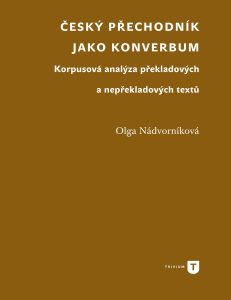
Olga Nádvorníková
This book investigates the Czech transgressive, a non-finite verb form, which belongs to the converb category, as a potential linguistic indicator of normalisation and interference in translation. In this research we treat normalisation as a T-universal, i.e. as the difference between translated and non-translated texts in the same language (Czech), and we define it as the tendency to conform to patterns and practices that are typical of the target language, even to the point of
exaggerating them. Interference is defined as negative transfer of such linguistic means of the source language that do not have the same function in the target language and can thus be felt as inappropriate. The analysis, focusing mainly on fiction and to some extent also on non-fiction texts, was performed on large-scale data from comparable, parallel and reference corpora. The potential effects of interference were investigated in detail on translations from French and Polish. The second research goal of this book was of a more qualitative nature, focusing on the analysis of linguistic, stylistic and translation norms that determine the use of the transgressive in texts and on the attitudes that translators and editors take towards these norms. The primary data source for the latter research goal was a questionnaire survey.
